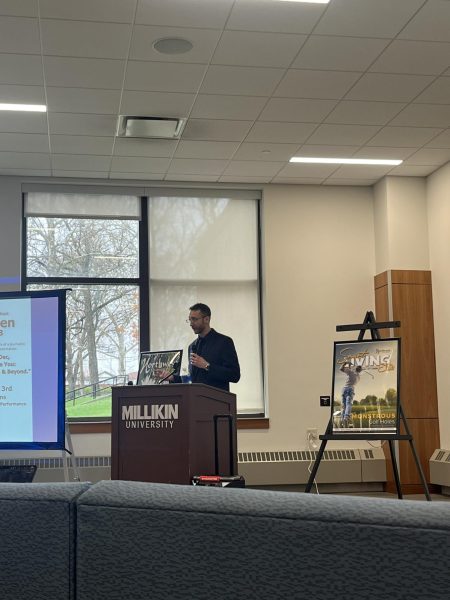Governor Rauner gives Preview State of the State Speech
On Tuesday, Jan. 28, recently elected governor Bruce Rauner spoke to the students and faculty of Richland Community College in what he described as a preview for the state of the state address that he will eventually give.
After beginning the speech by expressing his fondness for Richland Community College, as well as Decatur, Gov. Rauner began to discuss Illinois’s current situation, specifically bad deficits, unemployment, rising taxes, deteriorating schools, and crime throughout various communities.
Gov. Rauner then began discussing the lack of employment that has occurred in Illinois, specifically jobs that have been transferred to neighboring states of Illinois. Gov. Rauner then discussed his goal of getting Illinois back on track, or, in his own words “to make Illinois the most competitive state and the most compassionate state,” competitive pertaining to boosting Illinois’s economic growth as well as increasing the quality of education offered in Illinois, while compassionate pertains to the government of Illinois taking care of its most vulnerable citizens.
While discussing the “unsustainable path” that Illinois is currently on, Gov. Rauner addressed that a possible income tax hike is not the answer towards prosperity. Gov. Rauner then discussed Illinois five neighboring states: Indiana, Kentucky, Missouri, Iowa, and Wisconsin, specifically how many Illinois citizens have been migrating towards these other states in order to pursue a career. Gov. Rauner then discussed how his mission is to create a steady rise in inflation.
Gov. Rauner then described how many small businesses across the state are suffering, specifically pertaining to worker’s compensation, its cost being higher than the national average, which has lead to many Illinois citizens to seek jobs in other states. Gov. Rauner also said “the number one complaint after workers comp, the number one complaint that I hear from businesses is our property taxes,” which is ridiculously high in Illinois. In addition, Gov. Rauner discussed Illinois’s unemployment insurance is also high than other states. Gov. Rauner also discussed how the abuses of lawsuits are driving health practitioners, health insurance companies, public transit, and construction companies out of the state.
Switching gears to a more controversial topic, Gov. Rauner began explaining his plan for pensions for the citizens of Illinois. Because there are numerous state employees in Illinois, many of which are apart of various unions, who are able to negotiate their contracts, have created a high cost factor in Illinois, which Gov. Rauner said has the ability to decrease the funding in various state-wide projects, including the erection of schools. Because of this cost factor, Gov. Rauner advocated for “free-market competitive bidding,” to help sustain the economy. Gov. Rauner also advocated against “forced unionization,” instead letting workers choose whether they would want to join a union, which could help businesses in Illinois. Union would still be in Illinois, but they would now be decided by local voters whether or not to join a union. By doing this, growth in jobs, compensation, and more disposable income.
Focusing again on helping Illinois’s vulnerable citizens, Gov. Rauner described that, because the levels of population are lower than how high Medicaid is, figuring out a way to have the numbers correlate better with each other would allow the Illinois government to help the citizens that are truly in need.
Gov. Rauner further described how, even with low numbers of employees, the pay rate continues to increase, money of which is retrieved from social security taxes. In addition, Gov. Rauner discussed the insurance cost for government workers is too high, leading workers to retiring at earlier ages. Another correlating factor to the pension problem deals with workers who have their salaries raised right before they retire, which increases the damage.
Gov. Rauner ended his speech by discussing, by union leaders paying campaigning candidates, it creates a conflict of interest, taking money away from schools, students, and others who are in need.
Although Gov. Rauner has not held his position for very long, it is clear to say that he has the best interest in mind for our state business, schools, and citizens.










